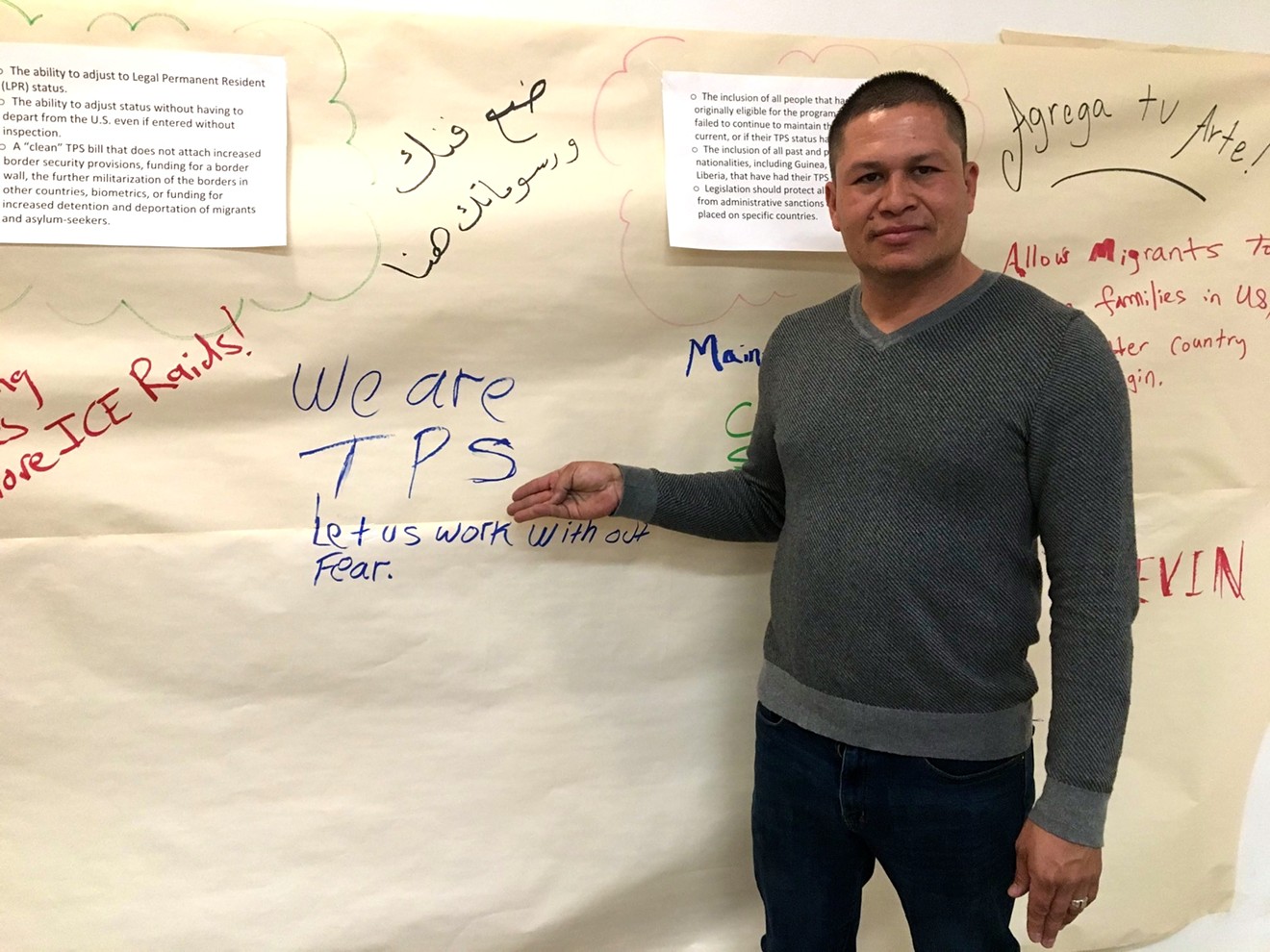Denver has long had a strong immigrant-rights community, one that conveys information to undocumented residents about how to protect themselves from immigration enforcement. But until recently, people around Denver with Temporary Protected Status — a program offered to people who arrive from specific countries that the Department of Homeland Security deems unsafe for reasons such as violence or natural disasters — were not so visible when it came to community organizing, even though some TPS holders, such as those from El Salvador, have been living in the United States for decades.
Much has changed under President Trump. Over the past year, his administration has announced the expiration of TPS for residents of countries including Haiti, Honduras, Nicaragua and Yemen. In January, the future of 263,000 TPS grantees from El Salvador was made uncertain when DHS announced that it will not renew their protected status, which expires in September 2019.
Now, immigrant-rights groups around Denver are scrambling to reach out to TPS communities in the Centennial State and provide information about the changes coming out of Washington, D.C. — and what to do if they find themselves subject to immigration enforcement. In late January, about fifty people gathered at the faith campus shared by Park Hill United Methodist Church and Temple Micah to discuss the future for TPS holders in Colorado.
"I think for TPS holders, it’s even scarier than for the larger undocumented population,” says Jenn Piper, an organizer with the American Friends Service Committee. “The reason people were granted TPS in the first place is because their country is unsafe for them. So whether you're talking about Syria — which actually is a war zone — or El Salvador, which has the same murder rate as a war zone, they're not places that are able to reabsorb people economically, but even more importantly, there are much higher risks for violence and extortion. Folks aren't only worried about the interruption of their lives here [in the United States], but also their physical safety if we get to the point of deportation."
At the January 27 event, lawyers and immigrant-rights organizers gave a similar kind of know-your-rights presentation routinely given to undocumented immigrants, covering things like the right to remain silent and requesting a warrant before letting ICE agents into a home. Here is a Facebook Live video from the event:
Piper adds that much of the time was spent trying to clear up confusion and myths about recent changes to TPS designations. For example, she says, "A couple folks had heard about a bill in Congress that would allow TPS holders to adjust their status and get permanent residency, and it wasn't clear to those folks whether that was already law or just a proposal — and it’s just a proposal."
The event also equipped TPS holders with information to provide to employers who might be confused about whether they can still legally employ people whose statuses are set to expire. (Answer: They can.)
"A lot of people are nervous about [their employment],” Piper explains. “Employers want to make sure that they're continuing to hire and employ people with legal status, and at the same time, the expiration date on some TPS holders' work permits says 2019. The administration is expecting employers to have a level of nuance and familiarity with the subject that they likely don't have, so we are trying to equip people with TPS with information so they can be confident when they speak with their employer and explain that they can still work."
About 1,400 Salvadorans, Hondurans and Haitians in Colorado are TPS holders, according to the Center for American Progress. There are also 1,600 U.S.-born children in Colorado whose parents are TPS holders. The organization also notes that “TPS holders are integral members of Colorado’s social fabric — Salvadoran, Honduran and Haitian TPS holders in Colorado have lived in the United States for an average of nineteen years.”
Piper says she was encouraged by the small but engaged turnout on January 27, and that there are likely to be more events to organize Colorado’s TPS holders.
"We're hoping that out of this crisis comes an opportunity to connect more with those communities and show that all the resources that our groups have are available to them," she says.
[
{
"name": "Air - MediumRectangle - Inline Content - Mobile Display Size",
"component": "12017618",
"insertPoint": "2",
"requiredCountToDisplay": "2"
},{
"name": "Editor Picks",
"component": "17242653",
"insertPoint": "4",
"requiredCountToDisplay": "1"
},{
"name": "Inline Links",
"component": "18838239",
"insertPoint": "8th",
"startingPoint": 8,
"requiredCountToDisplay": "7",
"maxInsertions": 25
},{
"name": "Air - MediumRectangle - Combo - Inline Content",
"component": "17261320",
"insertPoint": "8th",
"startingPoint": 8,
"requiredCountToDisplay": "7",
"maxInsertions": 25
},{
"name": "Inline Links",
"component": "18838239",
"insertPoint": "8th",
"startingPoint": 12,
"requiredCountToDisplay": "11",
"maxInsertions": 25
},{
"name": "Air - Leaderboard Tower - Combo - Inline Content",
"component": "17261321",
"insertPoint": "8th",
"startingPoint": 12,
"requiredCountToDisplay": "11",
"maxInsertions": 25
}
]












